Public Perception of Police Support for Sexual Abuse Victims in the UK
VerifiedAdded on 2023/06/14
|18
|4952
|82
AI Summary
This research project aims to collect information about the perception of public in relation to the support provided by police of the United Kingdom for sexually abused victims. The report will provide insights into the public perception of police support for sexual abuse victims in the United Kingdom and will highlight the actions taken by the police force to prevent sexual abuse.
Contribute Materials
Your contribution can guide someone’s learning journey. Share your
documents today.
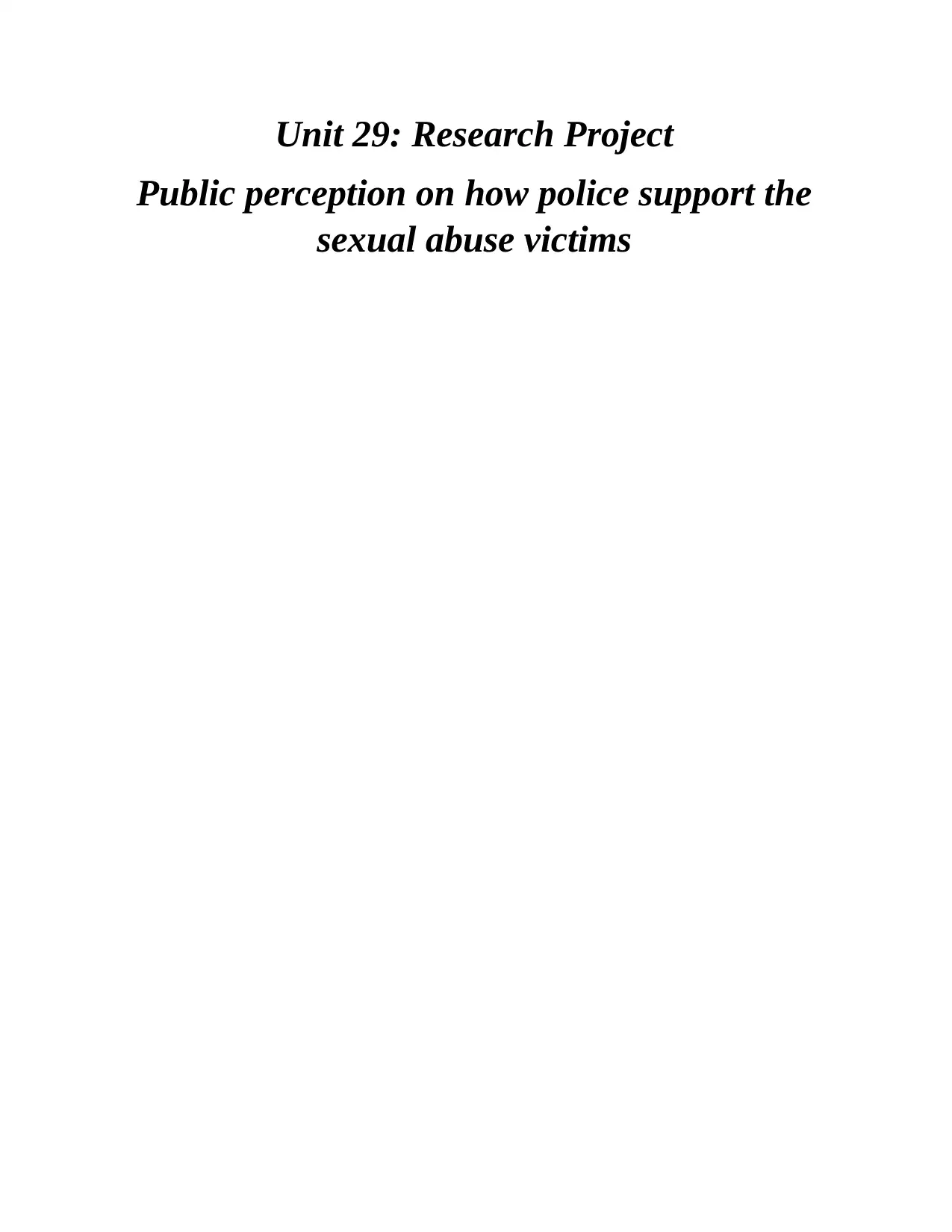
Unit 29: Research Project
Public perception on how police support the
sexual abuse victims
Public perception on how police support the
sexual abuse victims
Secure Best Marks with AI Grader
Need help grading? Try our AI Grader for instant feedback on your assignments.

Table of Contents
INTRODUCTION..............................................................................................................................2
MAIN BODY....................................................................................................................................2
Literature review.....................................................................................................................2
Methodology justification.......................................................................................................4
REFERENCES..................................................................................................................................6
APPENDIX 1....................................................................................................................7
INTRODUCTION..............................................................................................................................2
MAIN BODY....................................................................................................................................2
Literature review.....................................................................................................................2
Methodology justification.......................................................................................................4
REFERENCES..................................................................................................................................6
APPENDIX 1....................................................................................................................7
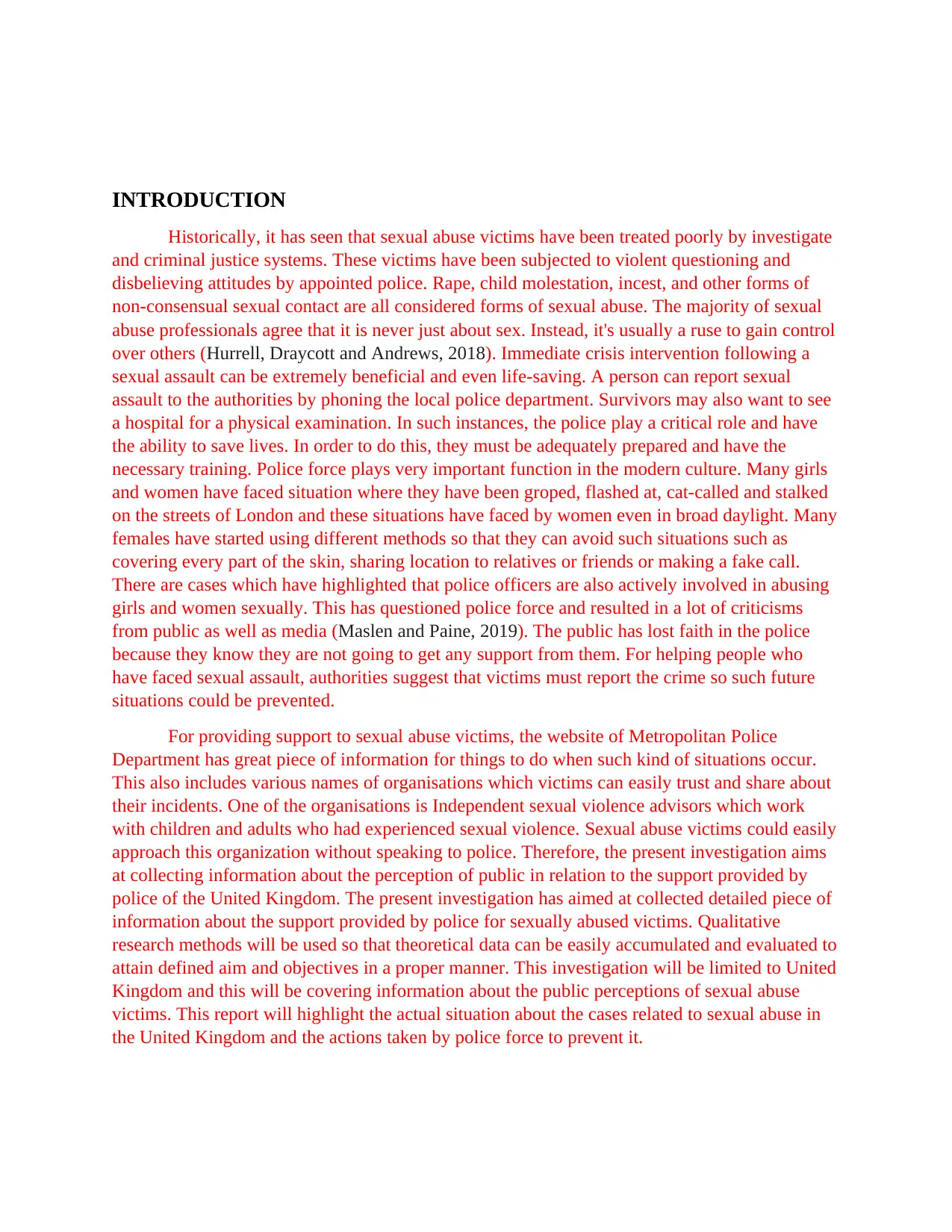
INTRODUCTION
Historically, it has seen that sexual abuse victims have been treated poorly by investigate
and criminal justice systems. These victims have been subjected to violent questioning and
disbelieving attitudes by appointed police. Rape, child molestation, incest, and other forms of
non-consensual sexual contact are all considered forms of sexual abuse. The majority of sexual
abuse professionals agree that it is never just about sex. Instead, it's usually a ruse to gain control
over others (Hurrell, Draycott and Andrews, 2018). Immediate crisis intervention following a
sexual assault can be extremely beneficial and even life-saving. A person can report sexual
assault to the authorities by phoning the local police department. Survivors may also want to see
a hospital for a physical examination. In such instances, the police play a critical role and have
the ability to save lives. In order to do this, they must be adequately prepared and have the
necessary training. Police force plays very important function in the modern culture. Many girls
and women have faced situation where they have been groped, flashed at, cat-called and stalked
on the streets of London and these situations have faced by women even in broad daylight. Many
females have started using different methods so that they can avoid such situations such as
covering every part of the skin, sharing location to relatives or friends or making a fake call.
There are cases which have highlighted that police officers are also actively involved in abusing
girls and women sexually. This has questioned police force and resulted in a lot of criticisms
from public as well as media (Maslen and Paine, 2019). The public has lost faith in the police
because they know they are not going to get any support from them. For helping people who
have faced sexual assault, authorities suggest that victims must report the crime so such future
situations could be prevented.
For providing support to sexual abuse victims, the website of Metropolitan Police
Department has great piece of information for things to do when such kind of situations occur.
This also includes various names of organisations which victims can easily trust and share about
their incidents. One of the organisations is Independent sexual violence advisors which work
with children and adults who had experienced sexual violence. Sexual abuse victims could easily
approach this organization without speaking to police. Therefore, the present investigation aims
at collecting information about the perception of public in relation to the support provided by
police of the United Kingdom. The present investigation has aimed at collected detailed piece of
information about the support provided by police for sexually abused victims. Qualitative
research methods will be used so that theoretical data can be easily accumulated and evaluated to
attain defined aim and objectives in a proper manner. This investigation will be limited to United
Kingdom and this will be covering information about the public perceptions of sexual abuse
victims. This report will highlight the actual situation about the cases related to sexual abuse in
the United Kingdom and the actions taken by police force to prevent it.
Historically, it has seen that sexual abuse victims have been treated poorly by investigate
and criminal justice systems. These victims have been subjected to violent questioning and
disbelieving attitudes by appointed police. Rape, child molestation, incest, and other forms of
non-consensual sexual contact are all considered forms of sexual abuse. The majority of sexual
abuse professionals agree that it is never just about sex. Instead, it's usually a ruse to gain control
over others (Hurrell, Draycott and Andrews, 2018). Immediate crisis intervention following a
sexual assault can be extremely beneficial and even life-saving. A person can report sexual
assault to the authorities by phoning the local police department. Survivors may also want to see
a hospital for a physical examination. In such instances, the police play a critical role and have
the ability to save lives. In order to do this, they must be adequately prepared and have the
necessary training. Police force plays very important function in the modern culture. Many girls
and women have faced situation where they have been groped, flashed at, cat-called and stalked
on the streets of London and these situations have faced by women even in broad daylight. Many
females have started using different methods so that they can avoid such situations such as
covering every part of the skin, sharing location to relatives or friends or making a fake call.
There are cases which have highlighted that police officers are also actively involved in abusing
girls and women sexually. This has questioned police force and resulted in a lot of criticisms
from public as well as media (Maslen and Paine, 2019). The public has lost faith in the police
because they know they are not going to get any support from them. For helping people who
have faced sexual assault, authorities suggest that victims must report the crime so such future
situations could be prevented.
For providing support to sexual abuse victims, the website of Metropolitan Police
Department has great piece of information for things to do when such kind of situations occur.
This also includes various names of organisations which victims can easily trust and share about
their incidents. One of the organisations is Independent sexual violence advisors which work
with children and adults who had experienced sexual violence. Sexual abuse victims could easily
approach this organization without speaking to police. Therefore, the present investigation aims
at collecting information about the perception of public in relation to the support provided by
police of the United Kingdom. The present investigation has aimed at collected detailed piece of
information about the support provided by police for sexually abused victims. Qualitative
research methods will be used so that theoretical data can be easily accumulated and evaluated to
attain defined aim and objectives in a proper manner. This investigation will be limited to United
Kingdom and this will be covering information about the public perceptions of sexual abuse
victims. This report will highlight the actual situation about the cases related to sexual abuse in
the United Kingdom and the actions taken by police force to prevent it.

Secure Best Marks with AI Grader
Need help grading? Try our AI Grader for instant feedback on your assignments.
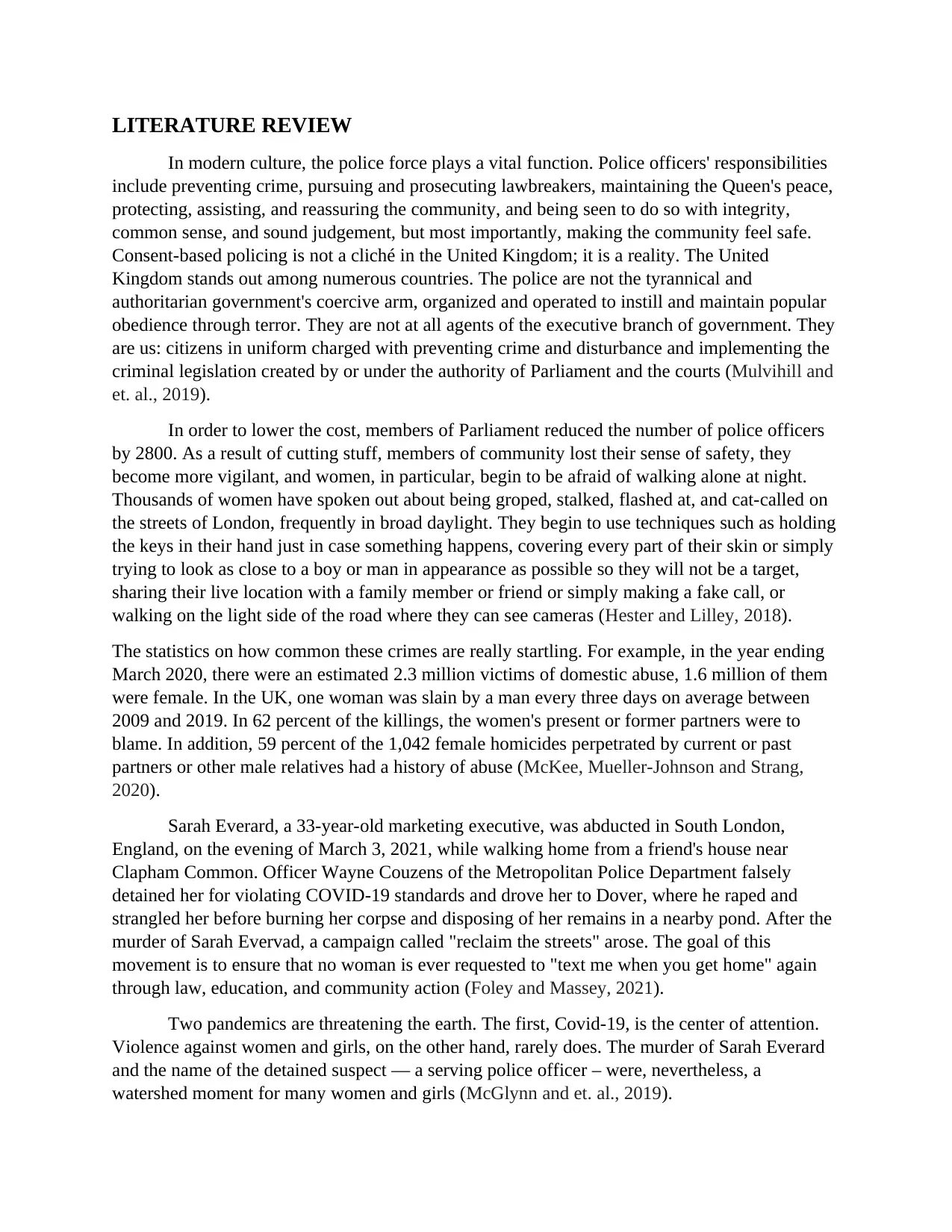
LITERATURE REVIEW
In modern culture, the police force plays a vital function. Police officers' responsibilities
include preventing crime, pursuing and prosecuting lawbreakers, maintaining the Queen's peace,
protecting, assisting, and reassuring the community, and being seen to do so with integrity,
common sense, and sound judgement, but most importantly, making the community feel safe.
Consent-based policing is not a cliché in the United Kingdom; it is a reality. The United
Kingdom stands out among numerous countries. The police are not the tyrannical and
authoritarian government's coercive arm, organized and operated to instill and maintain popular
obedience through terror. They are not at all agents of the executive branch of government. They
are us: citizens in uniform charged with preventing crime and disturbance and implementing the
criminal legislation created by or under the authority of Parliament and the courts (Mulvihill and
et. al., 2019).
In order to lower the cost, members of Parliament reduced the number of police officers
by 2800. As a result of cutting stuff, members of community lost their sense of safety, they
become more vigilant, and women, in particular, begin to be afraid of walking alone at night.
Thousands of women have spoken out about being groped, stalked, flashed at, and cat-called on
the streets of London, frequently in broad daylight. They begin to use techniques such as holding
the keys in their hand just in case something happens, covering every part of their skin or simply
trying to look as close to a boy or man in appearance as possible so they will not be a target,
sharing their live location with a family member or friend or simply making a fake call, or
walking on the light side of the road where they can see cameras (Hester and Lilley, 2018).
The statistics on how common these crimes are really startling. For example, in the year ending
March 2020, there were an estimated 2.3 million victims of domestic abuse, 1.6 million of them
were female. In the UK, one woman was slain by a man every three days on average between
2009 and 2019. In 62 percent of the killings, the women's present or former partners were to
blame. In addition, 59 percent of the 1,042 female homicides perpetrated by current or past
partners or other male relatives had a history of abuse (McKee, Mueller-Johnson and Strang,
2020).
Sarah Everard, a 33-year-old marketing executive, was abducted in South London,
England, on the evening of March 3, 2021, while walking home from a friend's house near
Clapham Common. Officer Wayne Couzens of the Metropolitan Police Department falsely
detained her for violating COVID-19 standards and drove her to Dover, where he raped and
strangled her before burning her corpse and disposing of her remains in a nearby pond. After the
murder of Sarah Evervad, a campaign called "reclaim the streets" arose. The goal of this
movement is to ensure that no woman is ever requested to "text me when you get home" again
through law, education, and community action (Foley and Massey, 2021).
Two pandemics are threatening the earth. The first, Covid-19, is the center of attention.
Violence against women and girls, on the other hand, rarely does. The murder of Sarah Everard
and the name of the detained suspect — a serving police officer – were, nevertheless, a
watershed moment for many women and girls (McGlynn and et. al., 2019).
In modern culture, the police force plays a vital function. Police officers' responsibilities
include preventing crime, pursuing and prosecuting lawbreakers, maintaining the Queen's peace,
protecting, assisting, and reassuring the community, and being seen to do so with integrity,
common sense, and sound judgement, but most importantly, making the community feel safe.
Consent-based policing is not a cliché in the United Kingdom; it is a reality. The United
Kingdom stands out among numerous countries. The police are not the tyrannical and
authoritarian government's coercive arm, organized and operated to instill and maintain popular
obedience through terror. They are not at all agents of the executive branch of government. They
are us: citizens in uniform charged with preventing crime and disturbance and implementing the
criminal legislation created by or under the authority of Parliament and the courts (Mulvihill and
et. al., 2019).
In order to lower the cost, members of Parliament reduced the number of police officers
by 2800. As a result of cutting stuff, members of community lost their sense of safety, they
become more vigilant, and women, in particular, begin to be afraid of walking alone at night.
Thousands of women have spoken out about being groped, stalked, flashed at, and cat-called on
the streets of London, frequently in broad daylight. They begin to use techniques such as holding
the keys in their hand just in case something happens, covering every part of their skin or simply
trying to look as close to a boy or man in appearance as possible so they will not be a target,
sharing their live location with a family member or friend or simply making a fake call, or
walking on the light side of the road where they can see cameras (Hester and Lilley, 2018).
The statistics on how common these crimes are really startling. For example, in the year ending
March 2020, there were an estimated 2.3 million victims of domestic abuse, 1.6 million of them
were female. In the UK, one woman was slain by a man every three days on average between
2009 and 2019. In 62 percent of the killings, the women's present or former partners were to
blame. In addition, 59 percent of the 1,042 female homicides perpetrated by current or past
partners or other male relatives had a history of abuse (McKee, Mueller-Johnson and Strang,
2020).
Sarah Everard, a 33-year-old marketing executive, was abducted in South London,
England, on the evening of March 3, 2021, while walking home from a friend's house near
Clapham Common. Officer Wayne Couzens of the Metropolitan Police Department falsely
detained her for violating COVID-19 standards and drove her to Dover, where he raped and
strangled her before burning her corpse and disposing of her remains in a nearby pond. After the
murder of Sarah Evervad, a campaign called "reclaim the streets" arose. The goal of this
movement is to ensure that no woman is ever requested to "text me when you get home" again
through law, education, and community action (Foley and Massey, 2021).
Two pandemics are threatening the earth. The first, Covid-19, is the center of attention.
Violence against women and girls, on the other hand, rarely does. The murder of Sarah Everard
and the name of the detained suspect — a serving police officer – were, nevertheless, a
watershed moment for many women and girls (McGlynn and et. al., 2019).
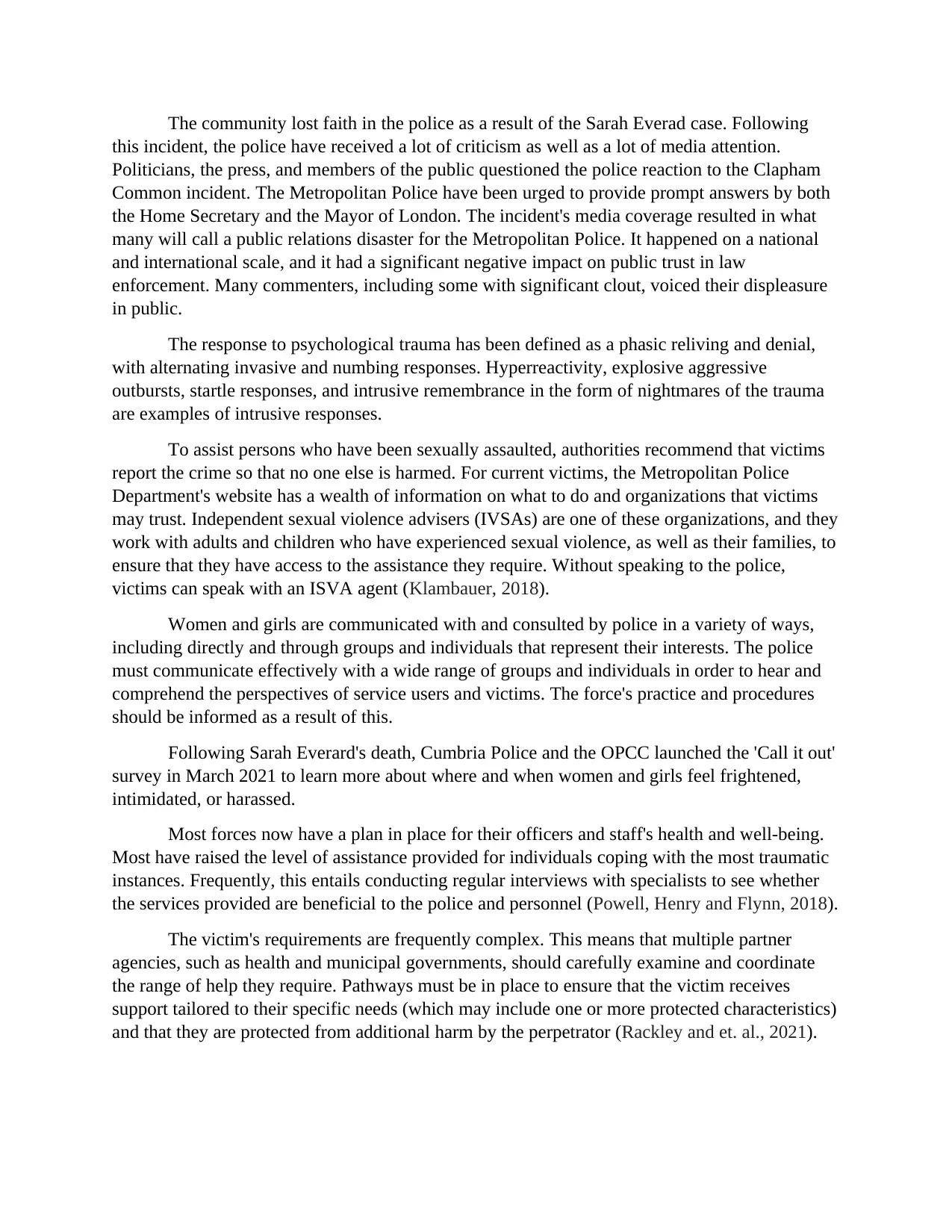
The community lost faith in the police as a result of the Sarah Everad case. Following
this incident, the police have received a lot of criticism as well as a lot of media attention.
Politicians, the press, and members of the public questioned the police reaction to the Clapham
Common incident. The Metropolitan Police have been urged to provide prompt answers by both
the Home Secretary and the Mayor of London. The incident's media coverage resulted in what
many will call a public relations disaster for the Metropolitan Police. It happened on a national
and international scale, and it had a significant negative impact on public trust in law
enforcement. Many commenters, including some with significant clout, voiced their displeasure
in public.
The response to psychological trauma has been defined as a phasic reliving and denial,
with alternating invasive and numbing responses. Hyperreactivity, explosive aggressive
outbursts, startle responses, and intrusive remembrance in the form of nightmares of the trauma
are examples of intrusive responses.
To assist persons who have been sexually assaulted, authorities recommend that victims
report the crime so that no one else is harmed. For current victims, the Metropolitan Police
Department's website has a wealth of information on what to do and organizations that victims
may trust. Independent sexual violence advisers (IVSAs) are one of these organizations, and they
work with adults and children who have experienced sexual violence, as well as their families, to
ensure that they have access to the assistance they require. Without speaking to the police,
victims can speak with an ISVA agent (Klambauer, 2018).
Women and girls are communicated with and consulted by police in a variety of ways,
including directly and through groups and individuals that represent their interests. The police
must communicate effectively with a wide range of groups and individuals in order to hear and
comprehend the perspectives of service users and victims. The force's practice and procedures
should be informed as a result of this.
Following Sarah Everard's death, Cumbria Police and the OPCC launched the 'Call it out'
survey in March 2021 to learn more about where and when women and girls feel frightened,
intimidated, or harassed.
Most forces now have a plan in place for their officers and staff's health and well-being.
Most have raised the level of assistance provided for individuals coping with the most traumatic
instances. Frequently, this entails conducting regular interviews with specialists to see whether
the services provided are beneficial to the police and personnel (Powell, Henry and Flynn, 2018).
The victim's requirements are frequently complex. This means that multiple partner
agencies, such as health and municipal governments, should carefully examine and coordinate
the range of help they require. Pathways must be in place to ensure that the victim receives
support tailored to their specific needs (which may include one or more protected characteristics)
and that they are protected from additional harm by the perpetrator (Rackley and et. al., 2021).
this incident, the police have received a lot of criticism as well as a lot of media attention.
Politicians, the press, and members of the public questioned the police reaction to the Clapham
Common incident. The Metropolitan Police have been urged to provide prompt answers by both
the Home Secretary and the Mayor of London. The incident's media coverage resulted in what
many will call a public relations disaster for the Metropolitan Police. It happened on a national
and international scale, and it had a significant negative impact on public trust in law
enforcement. Many commenters, including some with significant clout, voiced their displeasure
in public.
The response to psychological trauma has been defined as a phasic reliving and denial,
with alternating invasive and numbing responses. Hyperreactivity, explosive aggressive
outbursts, startle responses, and intrusive remembrance in the form of nightmares of the trauma
are examples of intrusive responses.
To assist persons who have been sexually assaulted, authorities recommend that victims
report the crime so that no one else is harmed. For current victims, the Metropolitan Police
Department's website has a wealth of information on what to do and organizations that victims
may trust. Independent sexual violence advisers (IVSAs) are one of these organizations, and they
work with adults and children who have experienced sexual violence, as well as their families, to
ensure that they have access to the assistance they require. Without speaking to the police,
victims can speak with an ISVA agent (Klambauer, 2018).
Women and girls are communicated with and consulted by police in a variety of ways,
including directly and through groups and individuals that represent their interests. The police
must communicate effectively with a wide range of groups and individuals in order to hear and
comprehend the perspectives of service users and victims. The force's practice and procedures
should be informed as a result of this.
Following Sarah Everard's death, Cumbria Police and the OPCC launched the 'Call it out'
survey in March 2021 to learn more about where and when women and girls feel frightened,
intimidated, or harassed.
Most forces now have a plan in place for their officers and staff's health and well-being.
Most have raised the level of assistance provided for individuals coping with the most traumatic
instances. Frequently, this entails conducting regular interviews with specialists to see whether
the services provided are beneficial to the police and personnel (Powell, Henry and Flynn, 2018).
The victim's requirements are frequently complex. This means that multiple partner
agencies, such as health and municipal governments, should carefully examine and coordinate
the range of help they require. Pathways must be in place to ensure that the victim receives
support tailored to their specific needs (which may include one or more protected characteristics)
and that they are protected from additional harm by the perpetrator (Rackley and et. al., 2021).
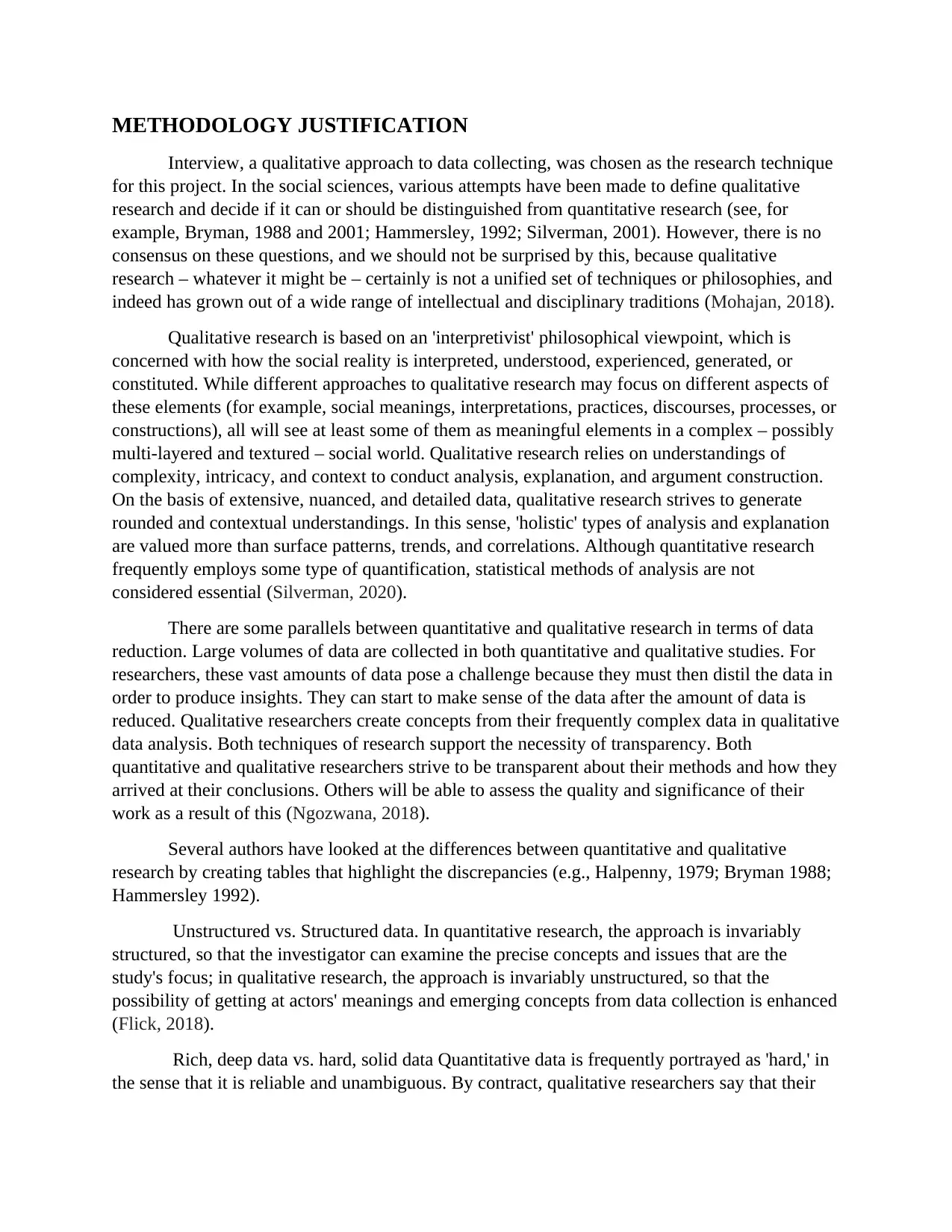
METHODOLOGY JUSTIFICATION
Interview, a qualitative approach to data collecting, was chosen as the research technique
for this project. In the social sciences, various attempts have been made to define qualitative
research and decide if it can or should be distinguished from quantitative research (see, for
example, Bryman, 1988 and 2001; Hammersley, 1992; Silverman, 2001). However, there is no
consensus on these questions, and we should not be surprised by this, because qualitative
research – whatever it might be – certainly is not a unified set of techniques or philosophies, and
indeed has grown out of a wide range of intellectual and disciplinary traditions (Mohajan, 2018).
Qualitative research is based on an 'interpretivist' philosophical viewpoint, which is
concerned with how the social reality is interpreted, understood, experienced, generated, or
constituted. While different approaches to qualitative research may focus on different aspects of
these elements (for example, social meanings, interpretations, practices, discourses, processes, or
constructions), all will see at least some of them as meaningful elements in a complex – possibly
multi-layered and textured – social world. Qualitative research relies on understandings of
complexity, intricacy, and context to conduct analysis, explanation, and argument construction.
On the basis of extensive, nuanced, and detailed data, qualitative research strives to generate
rounded and contextual understandings. In this sense, 'holistic' types of analysis and explanation
are valued more than surface patterns, trends, and correlations. Although quantitative research
frequently employs some type of quantification, statistical methods of analysis are not
considered essential (Silverman, 2020).
There are some parallels between quantitative and qualitative research in terms of data
reduction. Large volumes of data are collected in both quantitative and qualitative studies. For
researchers, these vast amounts of data pose a challenge because they must then distil the data in
order to produce insights. They can start to make sense of the data after the amount of data is
reduced. Qualitative researchers create concepts from their frequently complex data in qualitative
data analysis. Both techniques of research support the necessity of transparency. Both
quantitative and qualitative researchers strive to be transparent about their methods and how they
arrived at their conclusions. Others will be able to assess the quality and significance of their
work as a result of this (Ngozwana, 2018).
Several authors have looked at the differences between quantitative and qualitative
research by creating tables that highlight the discrepancies (e.g., Halpenny, 1979; Bryman 1988;
Hammersley 1992).
Unstructured vs. Structured data. In quantitative research, the approach is invariably
structured, so that the investigator can examine the precise concepts and issues that are the
study's focus; in qualitative research, the approach is invariably unstructured, so that the
possibility of getting at actors' meanings and emerging concepts from data collection is enhanced
(Flick, 2018).
Rich, deep data vs. hard, solid data Quantitative data is frequently portrayed as 'hard,' in
the sense that it is reliable and unambiguous. By contract, qualitative researchers say that their
Interview, a qualitative approach to data collecting, was chosen as the research technique
for this project. In the social sciences, various attempts have been made to define qualitative
research and decide if it can or should be distinguished from quantitative research (see, for
example, Bryman, 1988 and 2001; Hammersley, 1992; Silverman, 2001). However, there is no
consensus on these questions, and we should not be surprised by this, because qualitative
research – whatever it might be – certainly is not a unified set of techniques or philosophies, and
indeed has grown out of a wide range of intellectual and disciplinary traditions (Mohajan, 2018).
Qualitative research is based on an 'interpretivist' philosophical viewpoint, which is
concerned with how the social reality is interpreted, understood, experienced, generated, or
constituted. While different approaches to qualitative research may focus on different aspects of
these elements (for example, social meanings, interpretations, practices, discourses, processes, or
constructions), all will see at least some of them as meaningful elements in a complex – possibly
multi-layered and textured – social world. Qualitative research relies on understandings of
complexity, intricacy, and context to conduct analysis, explanation, and argument construction.
On the basis of extensive, nuanced, and detailed data, qualitative research strives to generate
rounded and contextual understandings. In this sense, 'holistic' types of analysis and explanation
are valued more than surface patterns, trends, and correlations. Although quantitative research
frequently employs some type of quantification, statistical methods of analysis are not
considered essential (Silverman, 2020).
There are some parallels between quantitative and qualitative research in terms of data
reduction. Large volumes of data are collected in both quantitative and qualitative studies. For
researchers, these vast amounts of data pose a challenge because they must then distil the data in
order to produce insights. They can start to make sense of the data after the amount of data is
reduced. Qualitative researchers create concepts from their frequently complex data in qualitative
data analysis. Both techniques of research support the necessity of transparency. Both
quantitative and qualitative researchers strive to be transparent about their methods and how they
arrived at their conclusions. Others will be able to assess the quality and significance of their
work as a result of this (Ngozwana, 2018).
Several authors have looked at the differences between quantitative and qualitative
research by creating tables that highlight the discrepancies (e.g., Halpenny, 1979; Bryman 1988;
Hammersley 1992).
Unstructured vs. Structured data. In quantitative research, the approach is invariably
structured, so that the investigator can examine the precise concepts and issues that are the
study's focus; in qualitative research, the approach is invariably unstructured, so that the
possibility of getting at actors' meanings and emerging concepts from data collection is enhanced
(Flick, 2018).
Rich, deep data vs. hard, solid data Quantitative data is frequently portrayed as 'hard,' in
the sense that it is reliable and unambiguous. By contract, qualitative researchers say that their
Paraphrase This Document
Need a fresh take? Get an instant paraphrase of this document with our AI Paraphraser
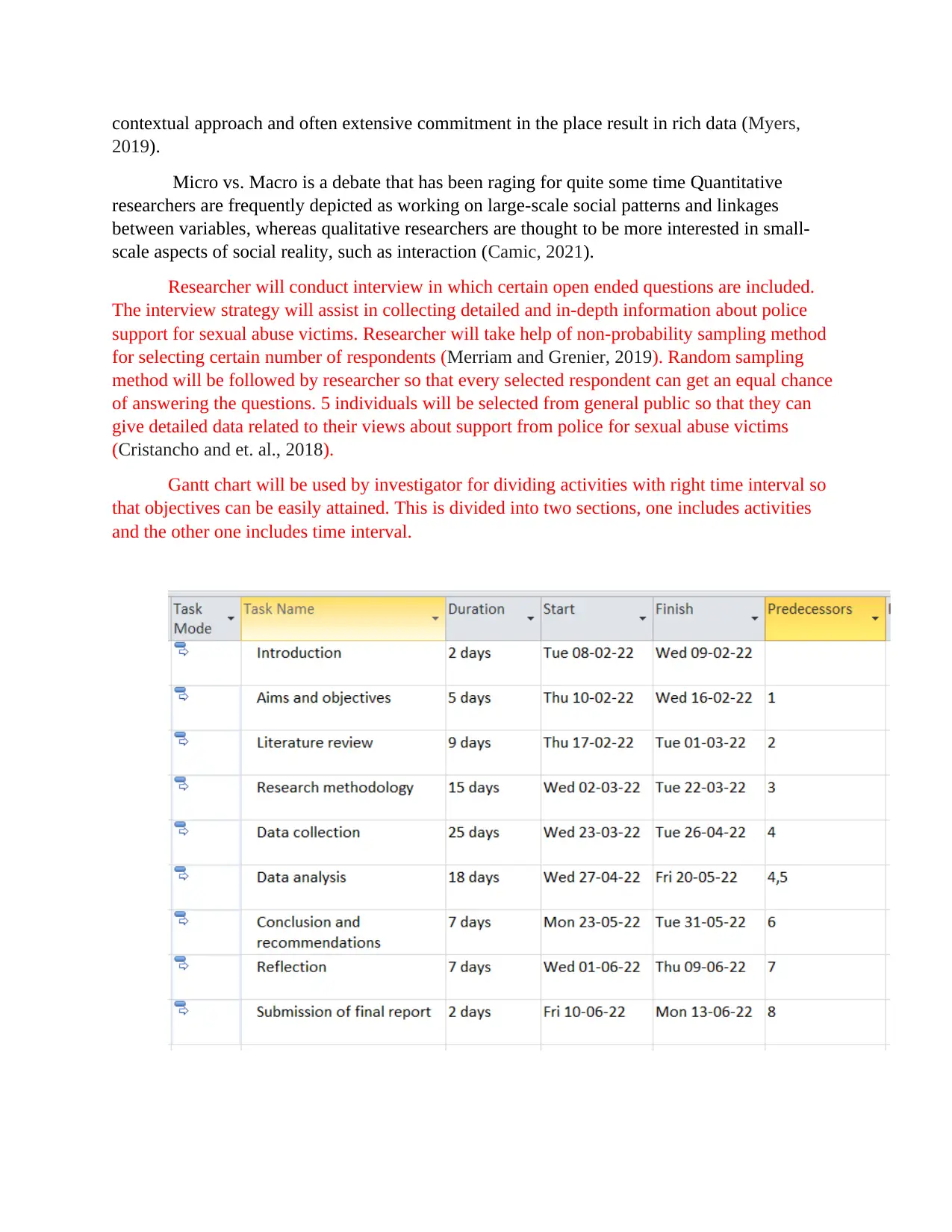
contextual approach and often extensive commitment in the place result in rich data (Myers,
2019).
Micro vs. Macro is a debate that has been raging for quite some time Quantitative
researchers are frequently depicted as working on large-scale social patterns and linkages
between variables, whereas qualitative researchers are thought to be more interested in small-
scale aspects of social reality, such as interaction (Camic, 2021).
Researcher will conduct interview in which certain open ended questions are included.
The interview strategy will assist in collecting detailed and in-depth information about police
support for sexual abuse victims. Researcher will take help of non-probability sampling method
for selecting certain number of respondents (Merriam and Grenier, 2019). Random sampling
method will be followed by researcher so that every selected respondent can get an equal chance
of answering the questions. 5 individuals will be selected from general public so that they can
give detailed data related to their views about support from police for sexual abuse victims
(Cristancho and et. al., 2018).
Gantt chart will be used by investigator for dividing activities with right time interval so
that objectives can be easily attained. This is divided into two sections, one includes activities
and the other one includes time interval.
2019).
Micro vs. Macro is a debate that has been raging for quite some time Quantitative
researchers are frequently depicted as working on large-scale social patterns and linkages
between variables, whereas qualitative researchers are thought to be more interested in small-
scale aspects of social reality, such as interaction (Camic, 2021).
Researcher will conduct interview in which certain open ended questions are included.
The interview strategy will assist in collecting detailed and in-depth information about police
support for sexual abuse victims. Researcher will take help of non-probability sampling method
for selecting certain number of respondents (Merriam and Grenier, 2019). Random sampling
method will be followed by researcher so that every selected respondent can get an equal chance
of answering the questions. 5 individuals will be selected from general public so that they can
give detailed data related to their views about support from police for sexual abuse victims
(Cristancho and et. al., 2018).
Gantt chart will be used by investigator for dividing activities with right time interval so
that objectives can be easily attained. This is divided into two sections, one includes activities
and the other one includes time interval.
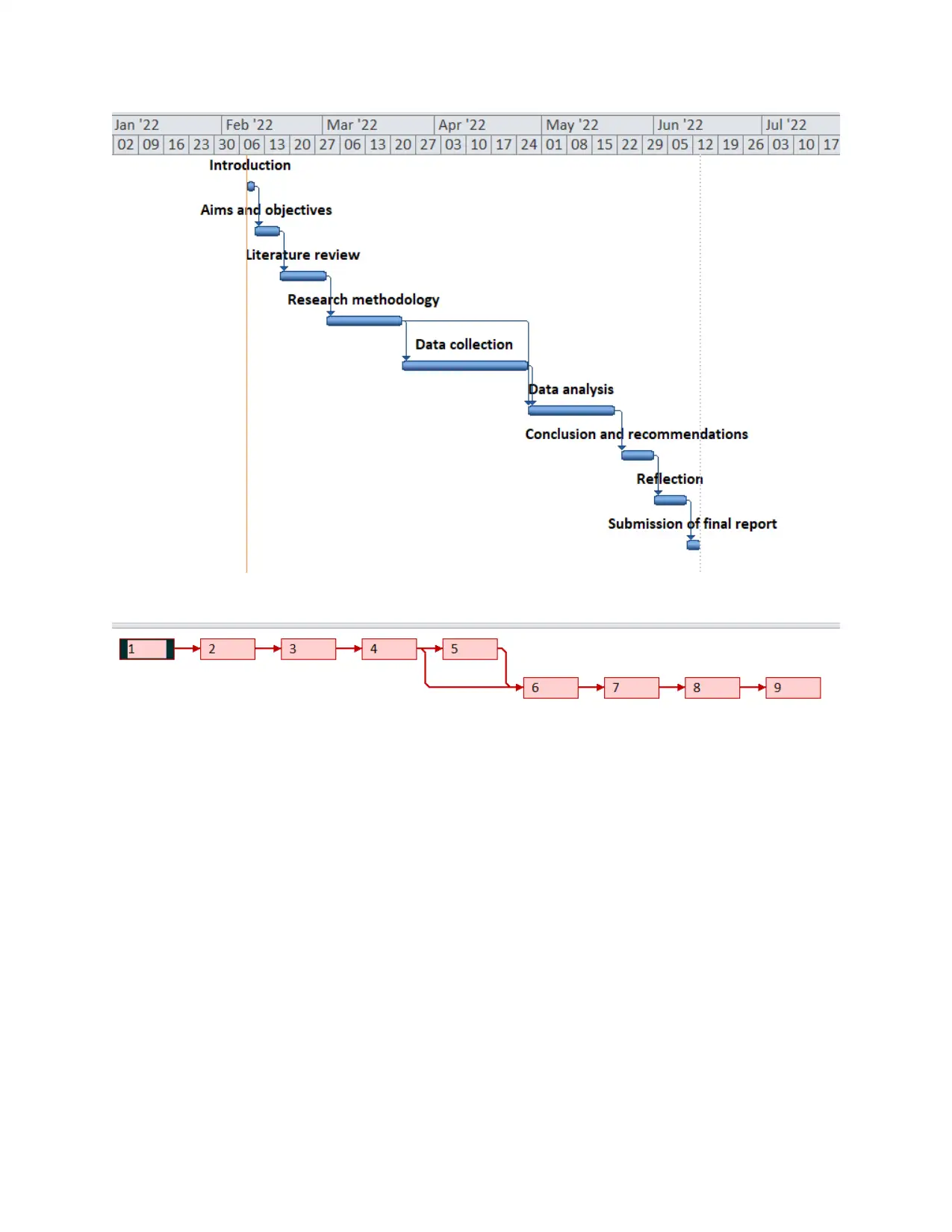
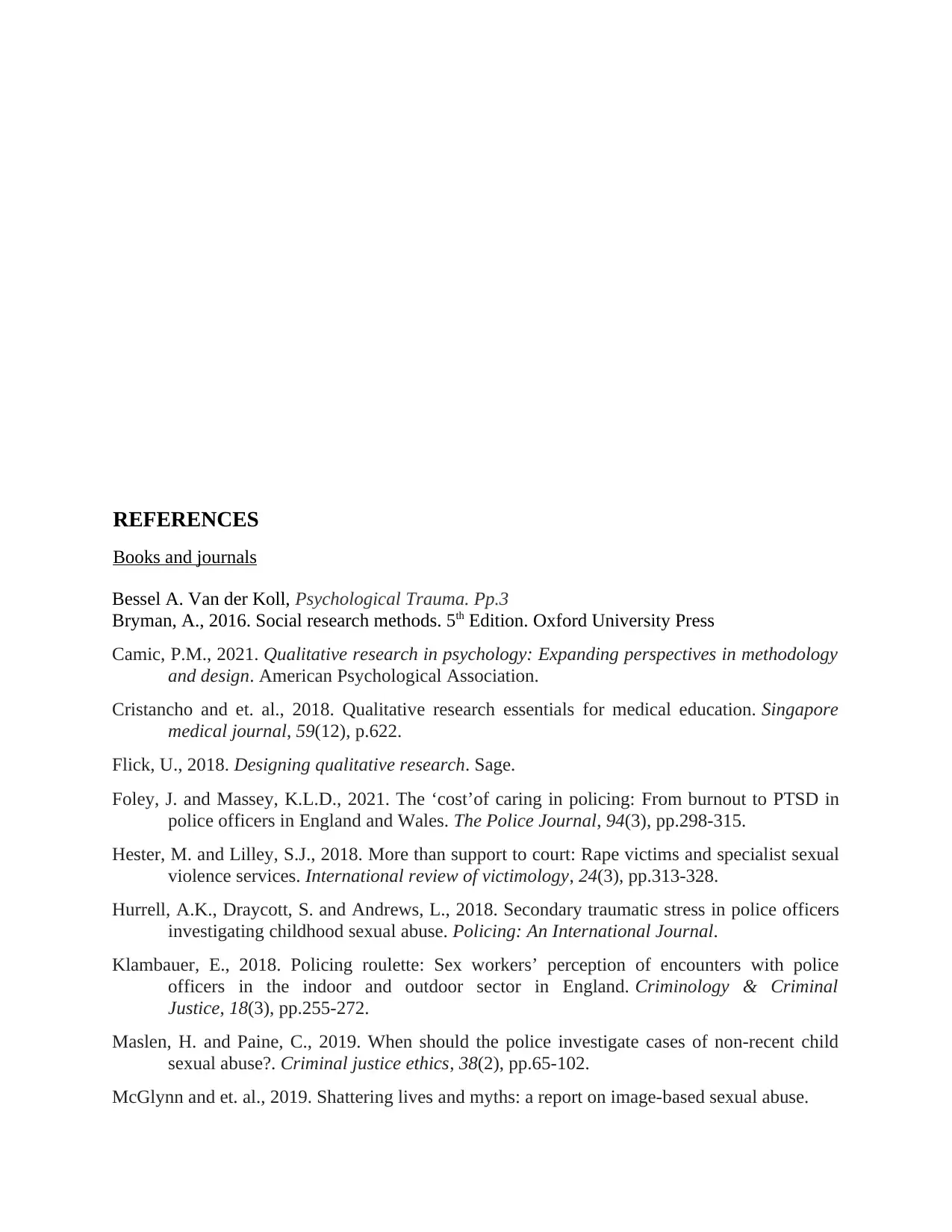
REFERENCES
Books and journals
Bessel A. Van der Koll, Psychological Trauma. Pp.3
Bryman, A., 2016. Social research methods. 5th Edition. Oxford University Press
Camic, P.M., 2021. Qualitative research in psychology: Expanding perspectives in methodology
and design. American Psychological Association.
Cristancho and et. al., 2018. Qualitative research essentials for medical education. Singapore
medical journal, 59(12), p.622.
Flick, U., 2018. Designing qualitative research. Sage.
Foley, J. and Massey, K.L.D., 2021. The ‘cost’of caring in policing: From burnout to PTSD in
police officers in England and Wales. The Police Journal, 94(3), pp.298-315.
Hester, M. and Lilley, S.J., 2018. More than support to court: Rape victims and specialist sexual
violence services. International review of victimology, 24(3), pp.313-328.
Hurrell, A.K., Draycott, S. and Andrews, L., 2018. Secondary traumatic stress in police officers
investigating childhood sexual abuse. Policing: An International Journal.
Klambauer, E., 2018. Policing roulette: Sex workers’ perception of encounters with police
officers in the indoor and outdoor sector in England. Criminology & Criminal
Justice, 18(3), pp.255-272.
Maslen, H. and Paine, C., 2019. When should the police investigate cases of non-recent child
sexual abuse?. Criminal justice ethics, 38(2), pp.65-102.
McGlynn and et. al., 2019. Shattering lives and myths: a report on image-based sexual abuse.
Books and journals
Bessel A. Van der Koll, Psychological Trauma. Pp.3
Bryman, A., 2016. Social research methods. 5th Edition. Oxford University Press
Camic, P.M., 2021. Qualitative research in psychology: Expanding perspectives in methodology
and design. American Psychological Association.
Cristancho and et. al., 2018. Qualitative research essentials for medical education. Singapore
medical journal, 59(12), p.622.
Flick, U., 2018. Designing qualitative research. Sage.
Foley, J. and Massey, K.L.D., 2021. The ‘cost’of caring in policing: From burnout to PTSD in
police officers in England and Wales. The Police Journal, 94(3), pp.298-315.
Hester, M. and Lilley, S.J., 2018. More than support to court: Rape victims and specialist sexual
violence services. International review of victimology, 24(3), pp.313-328.
Hurrell, A.K., Draycott, S. and Andrews, L., 2018. Secondary traumatic stress in police officers
investigating childhood sexual abuse. Policing: An International Journal.
Klambauer, E., 2018. Policing roulette: Sex workers’ perception of encounters with police
officers in the indoor and outdoor sector in England. Criminology & Criminal
Justice, 18(3), pp.255-272.
Maslen, H. and Paine, C., 2019. When should the police investigate cases of non-recent child
sexual abuse?. Criminal justice ethics, 38(2), pp.65-102.
McGlynn and et. al., 2019. Shattering lives and myths: a report on image-based sexual abuse.
Secure Best Marks with AI Grader
Need help grading? Try our AI Grader for instant feedback on your assignments.
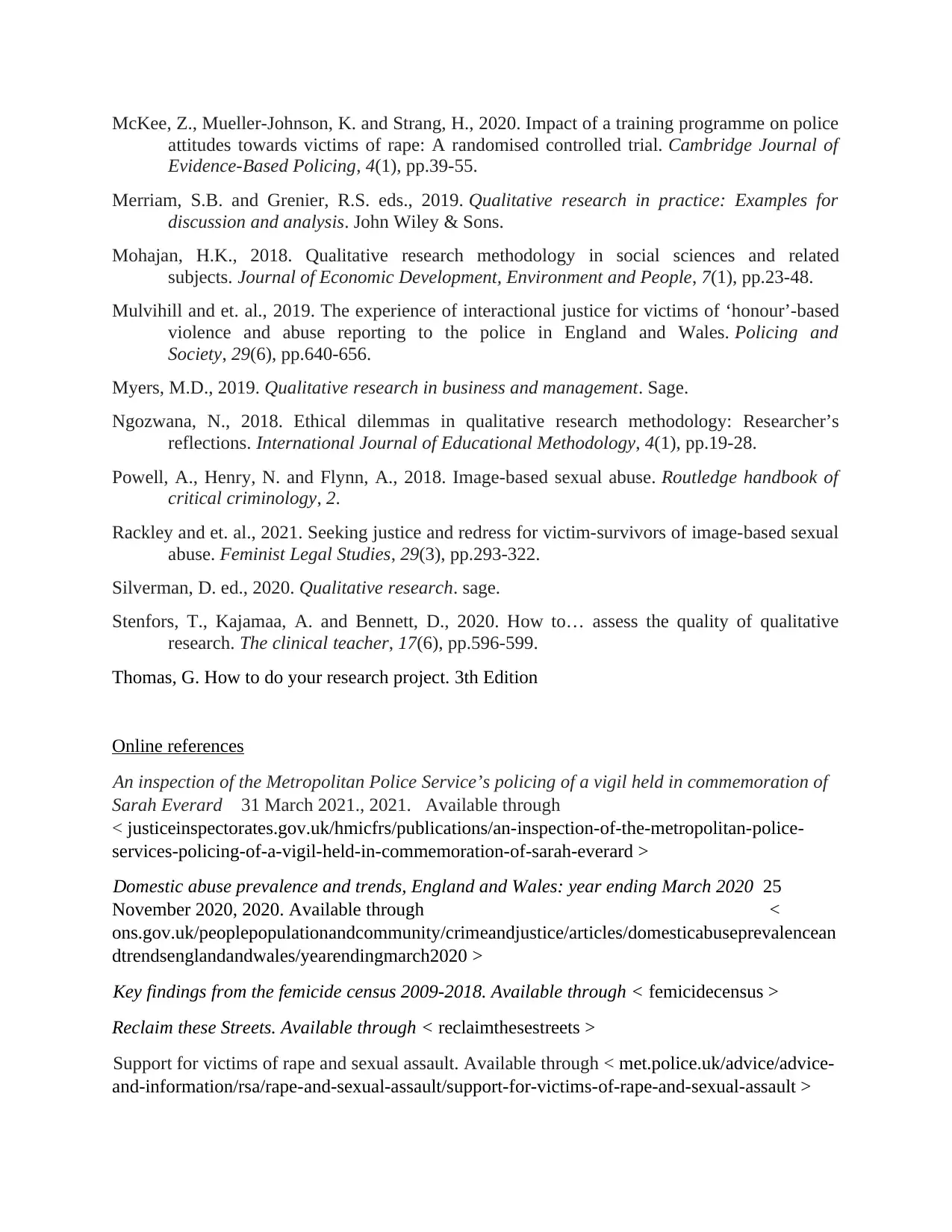
McKee, Z., Mueller-Johnson, K. and Strang, H., 2020. Impact of a training programme on police
attitudes towards victims of rape: A randomised controlled trial. Cambridge Journal of
Evidence-Based Policing, 4(1), pp.39-55.
Merriam, S.B. and Grenier, R.S. eds., 2019. Qualitative research in practice: Examples for
discussion and analysis. John Wiley & Sons.
Mohajan, H.K., 2018. Qualitative research methodology in social sciences and related
subjects. Journal of Economic Development, Environment and People, 7(1), pp.23-48.
Mulvihill and et. al., 2019. The experience of interactional justice for victims of ‘honour’-based
violence and abuse reporting to the police in England and Wales. Policing and
Society, 29(6), pp.640-656.
Myers, M.D., 2019. Qualitative research in business and management. Sage.
Ngozwana, N., 2018. Ethical dilemmas in qualitative research methodology: Researcher’s
reflections. International Journal of Educational Methodology, 4(1), pp.19-28.
Powell, A., Henry, N. and Flynn, A., 2018. Image-based sexual abuse. Routledge handbook of
critical criminology, 2.
Rackley and et. al., 2021. Seeking justice and redress for victim-survivors of image-based sexual
abuse. Feminist Legal Studies, 29(3), pp.293-322.
Silverman, D. ed., 2020. Qualitative research. sage.
Stenfors, T., Kajamaa, A. and Bennett, D., 2020. How to… assess the quality of qualitative
research. The clinical teacher, 17(6), pp.596-599.
Thomas, G. How to do your research project. 3th Edition
Online references
An inspection of the Metropolitan Police Service’s policing of a vigil held in commemoration of
Sarah Everard 31 March 2021., 2021. Available through
< justiceinspectorates.gov.uk/hmicfrs/publications/an-inspection-of-the-metropolitan-police-
services-policing-of-a-vigil-held-in-commemoration-of-sarah-everard >
Domestic abuse prevalence and trends, England and Wales: year ending March 2020 25
November 2020, 2020. Available through <
ons.gov.uk/peoplepopulationandcommunity/crimeandjustice/articles/domesticabuseprevalencean
dtrendsenglandandwales/yearendingmarch2020 >
Key findings from the femicide census 2009-2018. Available through < femicidecensus >
Reclaim these Streets. Available through < reclaimthesestreets >
Support for victims of rape and sexual assault. Available through < met.police.uk/advice/advice-
and-information/rsa/rape-and-sexual-assault/support-for-victims-of-rape-and-sexual-assault >
attitudes towards victims of rape: A randomised controlled trial. Cambridge Journal of
Evidence-Based Policing, 4(1), pp.39-55.
Merriam, S.B. and Grenier, R.S. eds., 2019. Qualitative research in practice: Examples for
discussion and analysis. John Wiley & Sons.
Mohajan, H.K., 2018. Qualitative research methodology in social sciences and related
subjects. Journal of Economic Development, Environment and People, 7(1), pp.23-48.
Mulvihill and et. al., 2019. The experience of interactional justice for victims of ‘honour’-based
violence and abuse reporting to the police in England and Wales. Policing and
Society, 29(6), pp.640-656.
Myers, M.D., 2019. Qualitative research in business and management. Sage.
Ngozwana, N., 2018. Ethical dilemmas in qualitative research methodology: Researcher’s
reflections. International Journal of Educational Methodology, 4(1), pp.19-28.
Powell, A., Henry, N. and Flynn, A., 2018. Image-based sexual abuse. Routledge handbook of
critical criminology, 2.
Rackley and et. al., 2021. Seeking justice and redress for victim-survivors of image-based sexual
abuse. Feminist Legal Studies, 29(3), pp.293-322.
Silverman, D. ed., 2020. Qualitative research. sage.
Stenfors, T., Kajamaa, A. and Bennett, D., 2020. How to… assess the quality of qualitative
research. The clinical teacher, 17(6), pp.596-599.
Thomas, G. How to do your research project. 3th Edition
Online references
An inspection of the Metropolitan Police Service’s policing of a vigil held in commemoration of
Sarah Everard 31 March 2021., 2021. Available through
< justiceinspectorates.gov.uk/hmicfrs/publications/an-inspection-of-the-metropolitan-police-
services-policing-of-a-vigil-held-in-commemoration-of-sarah-everard >
Domestic abuse prevalence and trends, England and Wales: year ending March 2020 25
November 2020, 2020. Available through <
ons.gov.uk/peoplepopulationandcommunity/crimeandjustice/articles/domesticabuseprevalencean
dtrendsenglandandwales/yearendingmarch2020 >
Key findings from the femicide census 2009-2018. Available through < femicidecensus >
Reclaim these Streets. Available through < reclaimthesestreets >
Support for victims of rape and sexual assault. Available through < met.police.uk/advice/advice-
and-information/rsa/rape-and-sexual-assault/support-for-victims-of-rape-and-sexual-assault >

Vision and values of Metropolitan Police. Available through <
met.police.uk/police-forces/metropolitan-police/areas/about-us/about-the-met/vision-and-values
>
APPENDIX 1
Project Proposal
Students must complete this project proposal and submit it to an Ethics Committee for
consideration and approval. Students cannot proceed with data collection and analysis without
this formal approval.
Student Number 01003264
Submission Date 15.12.2021
Lecturer Rebecca Shepherd
Date of Submission to the Ethics Committee 12.11.2021
Proposed Title of the Project Public perception on how police support the
sexual abuse victims
Section 1
met.police.uk/police-forces/metropolitan-police/areas/about-us/about-the-met/vision-and-values
>
APPENDIX 1
Project Proposal
Students must complete this project proposal and submit it to an Ethics Committee for
consideration and approval. Students cannot proceed with data collection and analysis without
this formal approval.
Student Number 01003264
Submission Date 15.12.2021
Lecturer Rebecca Shepherd
Date of Submission to the Ethics Committee 12.11.2021
Proposed Title of the Project Public perception on how police support the
sexual abuse victims
Section 1
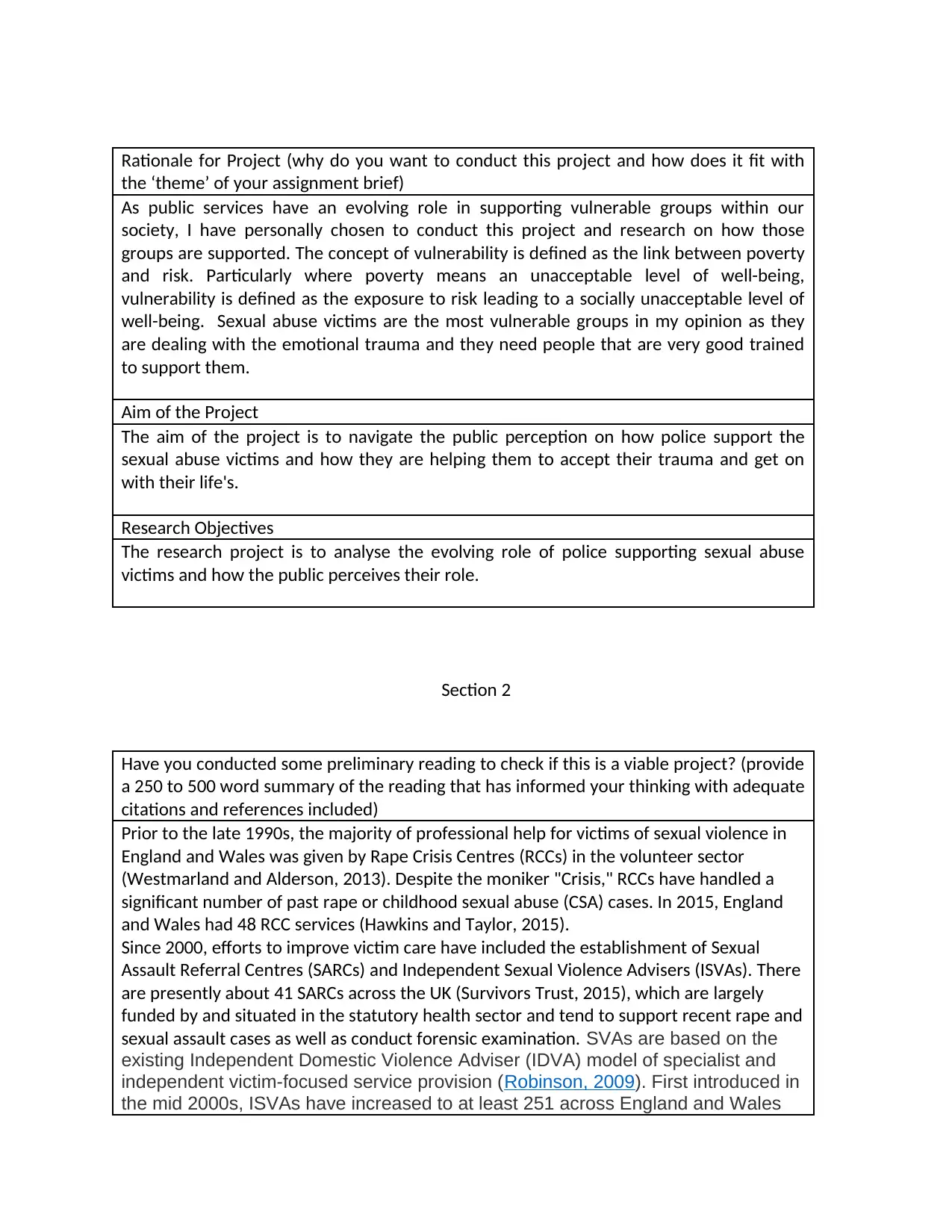
Rationale for Project (why do you want to conduct this project and how does it fit with
the ‘theme’ of your assignment brief)
As public services have an evolving role in supporting vulnerable groups within our
society, I have personally chosen to conduct this project and research on how those
groups are supported. The concept of vulnerability is defined as the link between poverty
and risk. Particularly where poverty means an unacceptable level of well-being,
vulnerability is defined as the exposure to risk leading to a socially unacceptable level of
well-being. Sexual abuse victims are the most vulnerable groups in my opinion as they
are dealing with the emotional trauma and they need people that are very good trained
to support them.
Aim of the Project
The aim of the project is to navigate the public perception on how police support the
sexual abuse victims and how they are helping them to accept their trauma and get on
with their life's.
Research Objectives
The research project is to analyse the evolving role of police supporting sexual abuse
victims and how the public perceives their role.
Section 2
Have you conducted some preliminary reading to check if this is a viable project? (provide
a 250 to 500 word summary of the reading that has informed your thinking with adequate
citations and references included)
Prior to the late 1990s, the majority of professional help for victims of sexual violence in
England and Wales was given by Rape Crisis Centres (RCCs) in the volunteer sector
(Westmarland and Alderson, 2013). Despite the moniker "Crisis," RCCs have handled a
significant number of past rape or childhood sexual abuse (CSA) cases. In 2015, England
and Wales had 48 RCC services (Hawkins and Taylor, 2015).
Since 2000, efforts to improve victim care have included the establishment of Sexual
Assault Referral Centres (SARCs) and Independent Sexual Violence Advisers (ISVAs). There
are presently about 41 SARCs across the UK (Survivors Trust, 2015), which are largely
funded by and situated in the statutory health sector and tend to support recent rape and
sexual assault cases as well as conduct forensic examination. SVAs are based on the
existing Independent Domestic Violence Adviser (IDVA) model of specialist and
independent victim-focused service provision (Robinson, 2009). First introduced in
the mid 2000s, ISVAs have increased to at least 251 across England and Wales
the ‘theme’ of your assignment brief)
As public services have an evolving role in supporting vulnerable groups within our
society, I have personally chosen to conduct this project and research on how those
groups are supported. The concept of vulnerability is defined as the link between poverty
and risk. Particularly where poverty means an unacceptable level of well-being,
vulnerability is defined as the exposure to risk leading to a socially unacceptable level of
well-being. Sexual abuse victims are the most vulnerable groups in my opinion as they
are dealing with the emotional trauma and they need people that are very good trained
to support them.
Aim of the Project
The aim of the project is to navigate the public perception on how police support the
sexual abuse victims and how they are helping them to accept their trauma and get on
with their life's.
Research Objectives
The research project is to analyse the evolving role of police supporting sexual abuse
victims and how the public perceives their role.
Section 2
Have you conducted some preliminary reading to check if this is a viable project? (provide
a 250 to 500 word summary of the reading that has informed your thinking with adequate
citations and references included)
Prior to the late 1990s, the majority of professional help for victims of sexual violence in
England and Wales was given by Rape Crisis Centres (RCCs) in the volunteer sector
(Westmarland and Alderson, 2013). Despite the moniker "Crisis," RCCs have handled a
significant number of past rape or childhood sexual abuse (CSA) cases. In 2015, England
and Wales had 48 RCC services (Hawkins and Taylor, 2015).
Since 2000, efforts to improve victim care have included the establishment of Sexual
Assault Referral Centres (SARCs) and Independent Sexual Violence Advisers (ISVAs). There
are presently about 41 SARCs across the UK (Survivors Trust, 2015), which are largely
funded by and situated in the statutory health sector and tend to support recent rape and
sexual assault cases as well as conduct forensic examination. SVAs are based on the
existing Independent Domestic Violence Adviser (IDVA) model of specialist and
independent victim-focused service provision (Robinson, 2009). First introduced in
the mid 2000s, ISVAs have increased to at least 251 across England and Wales
Paraphrase This Document
Need a fresh take? Get an instant paraphrase of this document with our AI Paraphraser

(Lea et al., 2015) and tend to be situated within SARCs or RCCs (Lea et al., 2015).
Guidance on SARCs specifies that they should have ISVAs as part of their
provision (Department of Health et al., 2009).
Section 3
Data Collection (explain how you intend to carry out the research project)
For my project, I have chosen quantitative research as I think this is the best way to see
the public perception and how they think the police is effective with vulnerable groups
and how they evolved over the years.
Sampling Rationale (explain who your participants are and how did you arrive to the
sampling calculation)
I think the best participants for me are my colleagues as they have different backgrounds
and are from different age groups.
Access to the organisation (explain how you will access the participants and/or the
organisation. If you have a letter of consent you must include in attachment to your
submission)
I was thinking to approach one of my friends as He is a police officer in London and he
could help me understand better what they do in order to be prepared to deal with
people that suffered from sexual abuse and how the Police as institution evolved over the
years.
Section 4
Timescale (how long will it take for you to complete this project. Consider breaking down
your tasks using either a Gantt Chart or a Work Breakdown structure)
November-December: Research proposal
Mid of January-February: Collecting the data and writing some bullet point
March: Writing the assignment based on the bullet points and ideas
Aprile: Checking the project and submitting
Guidance on SARCs specifies that they should have ISVAs as part of their
provision (Department of Health et al., 2009).
Section 3
Data Collection (explain how you intend to carry out the research project)
For my project, I have chosen quantitative research as I think this is the best way to see
the public perception and how they think the police is effective with vulnerable groups
and how they evolved over the years.
Sampling Rationale (explain who your participants are and how did you arrive to the
sampling calculation)
I think the best participants for me are my colleagues as they have different backgrounds
and are from different age groups.
Access to the organisation (explain how you will access the participants and/or the
organisation. If you have a letter of consent you must include in attachment to your
submission)
I was thinking to approach one of my friends as He is a police officer in London and he
could help me understand better what they do in order to be prepared to deal with
people that suffered from sexual abuse and how the Police as institution evolved over the
years.
Section 4
Timescale (how long will it take for you to complete this project. Consider breaking down
your tasks using either a Gantt Chart or a Work Breakdown structure)
November-December: Research proposal
Mid of January-February: Collecting the data and writing some bullet point
March: Writing the assignment based on the bullet points and ideas
Aprile: Checking the project and submitting
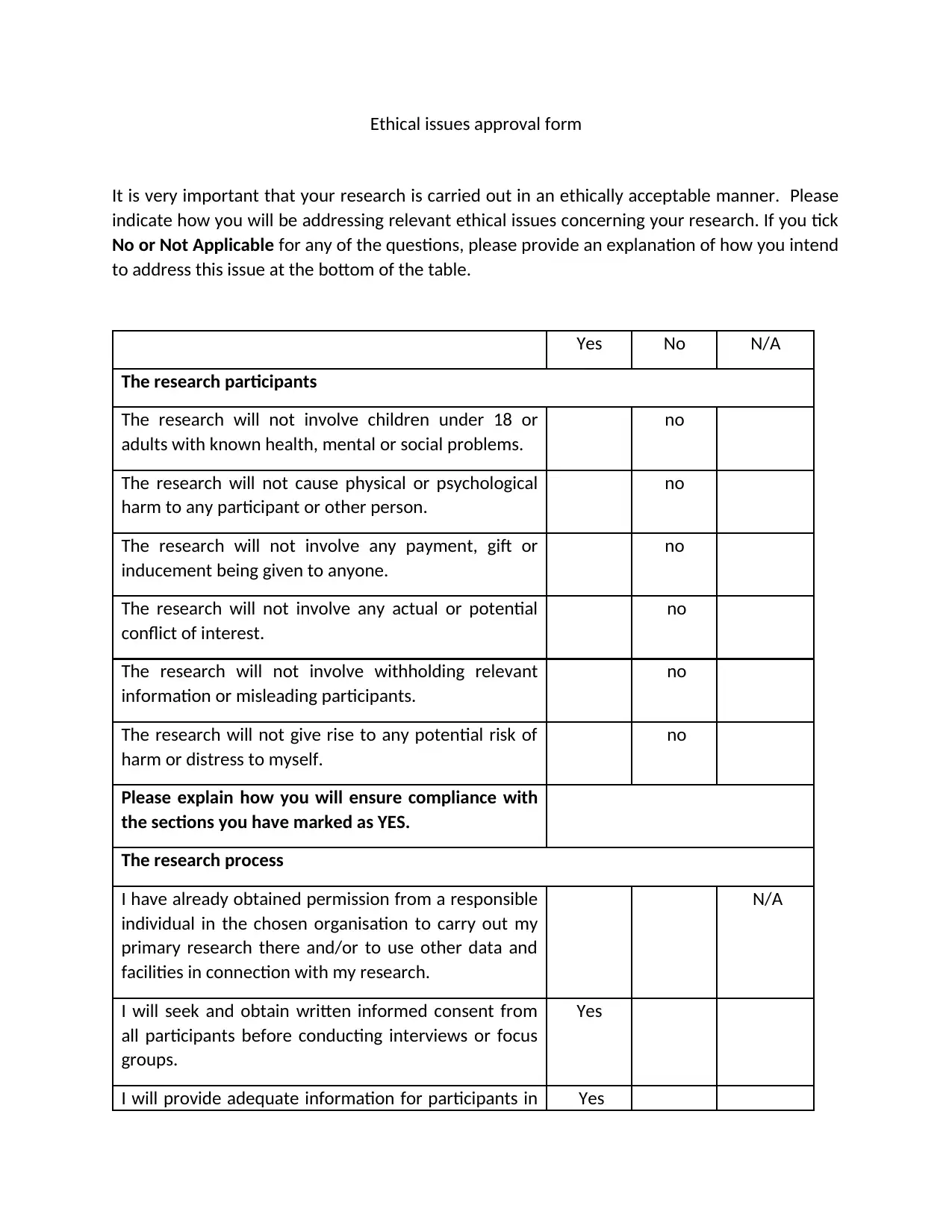
Ethical issues approval form
It is very important that your research is carried out in an ethically acceptable manner. Please
indicate how you will be addressing relevant ethical issues concerning your research. If you tick
No or Not Applicable for any of the questions, please provide an explanation of how you intend
to address this issue at the bottom of the table.
Yes No N/A
The research participants
The research will not involve children under 18 or
adults with known health, mental or social problems.
no
The research will not cause physical or psychological
harm to any participant or other person.
no
The research will not involve any payment, gift or
inducement being given to anyone.
no
The research will not involve any actual or potential
conflict of interest.
no
The research will not involve withholding relevant
information or misleading participants.
no
The research will not give rise to any potential risk of
harm or distress to myself.
no
Please explain how you will ensure compliance with
the sections you have marked as YES.
The research process
I have already obtained permission from a responsible
individual in the chosen organisation to carry out my
primary research there and/or to use other data and
facilities in connection with my research.
N/A
I will seek and obtain written informed consent from
all participants before conducting interviews or focus
groups.
Yes
I will provide adequate information for participants in Yes
It is very important that your research is carried out in an ethically acceptable manner. Please
indicate how you will be addressing relevant ethical issues concerning your research. If you tick
No or Not Applicable for any of the questions, please provide an explanation of how you intend
to address this issue at the bottom of the table.
Yes No N/A
The research participants
The research will not involve children under 18 or
adults with known health, mental or social problems.
no
The research will not cause physical or psychological
harm to any participant or other person.
no
The research will not involve any payment, gift or
inducement being given to anyone.
no
The research will not involve any actual or potential
conflict of interest.
no
The research will not involve withholding relevant
information or misleading participants.
no
The research will not give rise to any potential risk of
harm or distress to myself.
no
Please explain how you will ensure compliance with
the sections you have marked as YES.
The research process
I have already obtained permission from a responsible
individual in the chosen organisation to carry out my
primary research there and/or to use other data and
facilities in connection with my research.
N/A
I will seek and obtain written informed consent from
all participants before conducting interviews or focus
groups.
Yes
I will provide adequate information for participants in Yes

a questionnaire survey so that they can make an
informed decision whether to participate.
I will ensure participant data, including recordings, is
treated confidentially, and stored securely during the
research project and is destroyed once my final
module result has been confirmed.
Yes
I will preserve the anonymity of, and information
about, informants unless they give their express
permission in advance.
Yes
I will not name any individuals in my assignment(s)
where this may potentially cause them harm or
problems.
Yes
I will respect the right of participants to withdraw their
co-operation without notice or reason at any stage.
Yes
Please explain how you will ensure compliance with
the sections you have marked as YES.
I will protect my data files with
passwords and I will not use real
names.
Use and publication
The findings from my research will be used solely for
the purposes of the assignment(s) on this module and
will not be used for any other purpose without the
written approval of DGHE and the organisation which
is the subject of the research.
Yes
I will not publish my final research or use data
collected during the research project without first
gaining the written consent of DGHE and the
organisation where the primary research was
conducted.
Yes
Please explain how you will ensure compliance with
the sections you have marked as YES.
Honesty and integrity
I will always act honestly and in such a way as not to
reflect discredit on the college, its staff, or students;
Yes
informed decision whether to participate.
I will ensure participant data, including recordings, is
treated confidentially, and stored securely during the
research project and is destroyed once my final
module result has been confirmed.
Yes
I will preserve the anonymity of, and information
about, informants unless they give their express
permission in advance.
Yes
I will not name any individuals in my assignment(s)
where this may potentially cause them harm or
problems.
Yes
I will respect the right of participants to withdraw their
co-operation without notice or reason at any stage.
Yes
Please explain how you will ensure compliance with
the sections you have marked as YES.
I will protect my data files with
passwords and I will not use real
names.
Use and publication
The findings from my research will be used solely for
the purposes of the assignment(s) on this module and
will not be used for any other purpose without the
written approval of DGHE and the organisation which
is the subject of the research.
Yes
I will not publish my final research or use data
collected during the research project without first
gaining the written consent of DGHE and the
organisation where the primary research was
conducted.
Yes
Please explain how you will ensure compliance with
the sections you have marked as YES.
Honesty and integrity
I will always act honestly and in such a way as not to
reflect discredit on the college, its staff, or students;
Yes
Secure Best Marks with AI Grader
Need help grading? Try our AI Grader for instant feedback on your assignments.

and not to cause distress, embarrassment or
unpleasantness to any party whether before, during or
following contact with them.
I will not make up my results: all my data will be
collected by me and be presented honestly.
Yes
I will cite sources correctly and not plagiarise other
authors’ work.
Yes
Please explain how you will ensure compliance with
the sections you have marked as YES.
Confirmation by the student
In signing this research ethics application form, I am also confirming that:
- Primary research must not begin until ethical approval has been granted.
- The form is accurate to the best of my knowledge and belief.
- When I carry out the research, I will fully honour the commitments made in this
approval form (unless any change has first been given specific approval by my
teacher/supervisor).
- I understand that the project, including research records and data, may be subject to
inspection if required in future.
Signature of Applicant: Sabrina Cristina Gherca
Full Name of Applicant: Sabrina Cristina Gherca
Student ID number:01003264
To be completed by the Ethics Committee
Presented by (lecturer name)
Jack Adams
unpleasantness to any party whether before, during or
following contact with them.
I will not make up my results: all my data will be
collected by me and be presented honestly.
Yes
I will cite sources correctly and not plagiarise other
authors’ work.
Yes
Please explain how you will ensure compliance with
the sections you have marked as YES.
Confirmation by the student
In signing this research ethics application form, I am also confirming that:
- Primary research must not begin until ethical approval has been granted.
- The form is accurate to the best of my knowledge and belief.
- When I carry out the research, I will fully honour the commitments made in this
approval form (unless any change has first been given specific approval by my
teacher/supervisor).
- I understand that the project, including research records and data, may be subject to
inspection if required in future.
Signature of Applicant: Sabrina Cristina Gherca
Full Name of Applicant: Sabrina Cristina Gherca
Student ID number:01003264
To be completed by the Ethics Committee
Presented by (lecturer name)
Jack Adams

Initial Comments for consideration
Change to interviews for public perception and
enhance research objectives.
Presented to the Ethics Committee on (date) 17/11/2021
Comments by the Ethics Committee
Unclear who the participants are. We
recommend using your peers at DGHE and gain
consent from DGHE (Paul Talan).
Exclude public services students and focus on
Business, Health & Art and design students.
Approved / Not Approved Approved (subject to above changes)
Change to interviews for public perception and
enhance research objectives.
Presented to the Ethics Committee on (date) 17/11/2021
Comments by the Ethics Committee
Unclear who the participants are. We
recommend using your peers at DGHE and gain
consent from DGHE (Paul Talan).
Exclude public services students and focus on
Business, Health & Art and design students.
Approved / Not Approved Approved (subject to above changes)
1 out of 18
Your All-in-One AI-Powered Toolkit for Academic Success.
+13062052269
info@desklib.com
Available 24*7 on WhatsApp / Email
![[object Object]](/_next/static/media/star-bottom.7253800d.svg)
Unlock your academic potential
© 2024 | Zucol Services PVT LTD | All rights reserved.





